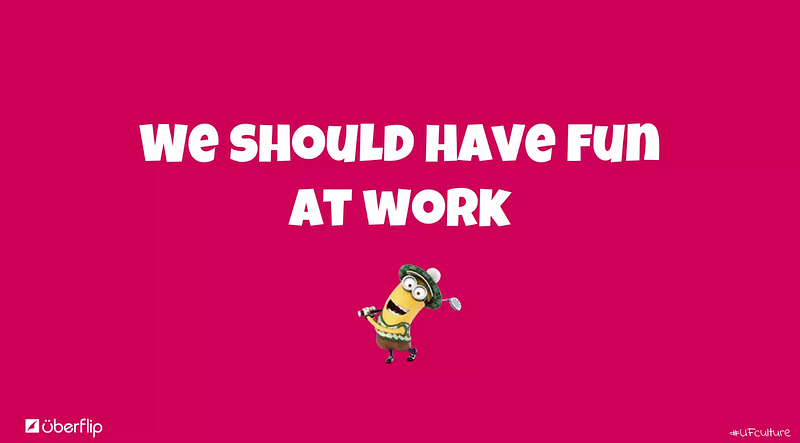The Illusion of Fun at Work: A Cautionary Tale
Written on
Chapter 1: The Reality Behind Corporate Fun
Recently, a director at a French tech firm won a lawsuit after being dismissed for opting out of boozy meetings that supposedly exemplified their "fun and professionalism" ethos. Vive la France!

In the past, before the rise of exaggerated corporate culture codes that resembled cult mantras—‘it’s not just a job, it’s your destiny’—there existed unspoken norms in software companies. At one organization I was part of, despite their marketing of a rather mediocre business application, the tech team behaved as if they were part of an elite company like Apple, exhibiting a strong case of Dunning-Kruger effect.
Upon my arrival, my marketing manager gave me a rapid tour, stopping frequently to deliver brief, hollow pep talks to passersby. She believed that employees should embody the company’s brand, enthusiastically answering calls and interacting in a way that showcased their excitement about their workplace.
My conclusion: employees were treated as mere props to be orchestrated by management.
I distinctly recall an absurd off-site meeting where our marketing team engaged in theatrical performances to convey our corporate value proposition. What was intended to be humorous was only enjoyable for those who embraced the role-playing.
It's worth noting that while employees are subjected to these enforced fun activities, top executives are often exempt.
During a casual gathering with our CEO, he feigned friendliness by awkwardly learning about each member of his "world-class" team. When I made a light-hearted comment, he shot me a piercing glance and responded with a sarcastic quip before moving on. Clearly, he was all business, devoid of any fun.
I learned an important lesson: employees are expected to perform as scripted for an audience.
The higher-ups and C-suite members show little interest in corporate culture or camaraderie. As is often the case in tech companies—except for notable exceptions like WeWork—they do not adhere to the company culture. In fact, they are more likely to mock those employees who do!
After all, they are the ones poised to cash out and escape to their luxurious retreats, leaving the rest of us to "enjoy" our next exciting startup adventure—this is the dark humor that the C-suite relishes.

Eventually, I found myself at a company that explicitly defined its culture, which, like many startup manifestos, included a statement that work “should be fun.” If it wasn’t, then you were clearly the problem.
While I acknowledge that work can occasionally be enjoyable, and I appreciate certain perks—such as well-stocked kitchens, espresso machines, and cozy lounges—asserting that work must be fun is fundamentally misguided, ignoring the harsh realities faced by tech employees.
According to these corporate documents, you must willingly take on additional responsibilities, selflessly assist others, remain perpetually available, avoid vacations longer than a week, never request a raise, and maintain an upbeat attitude, even amidst humiliating situations and baseless criticisms.
In this environment, the more work you have, the more "fun" it supposedly becomes. To ensure this fun mindset, your direct supervisor might adopt a friendly persona, acting as a buddy to promote a more enjoyable workplace. I've encountered such managers, who are merely executing the directives of upper management. These individuals can be particularly toxic.
Slavoj Žižek has provided an excellent critique of this corporate mentality.
They are not your friends; they are, at best, acquaintances with ulterior motives. From painful experiences shared by co-workers, I’ve learned that confiding in them only leads to your words being used against you during performance reviews, with HR involved to exacerbate your discomfort.
Now, back to Mr. T, our French protagonist. Luckily, he held a significant enough position to fight back and win his case. Unlike many executives, he chose not to fake his enthusiasm.
He was tired of the humiliation and toxic policies, which included bullying behavior that management tolerated. Startups that tout a fun atmosphere often embody the exact opposite. If it genuinely is fun, it doesn't need to be mandated—this is a given.
My recommendation: review the company’s culture code before accepting a job offer. If you find the word "fun" in their presentation, consider giving them the finger and walking away!
Chapter 2: The Forced Fun Debate
The first video titled "Companies trying to force fun on employees is weird" discusses the absurdity of enforced fun in workplaces, highlighting how it often backfires and demotivates staff.
The second video, "Horrible forced 'fun' at work - Corporate Cringe | #grindreel," further explores the cringe-worthy aspects of imposed enjoyment in corporate settings, revealing the negative impacts it can have on employee morale.